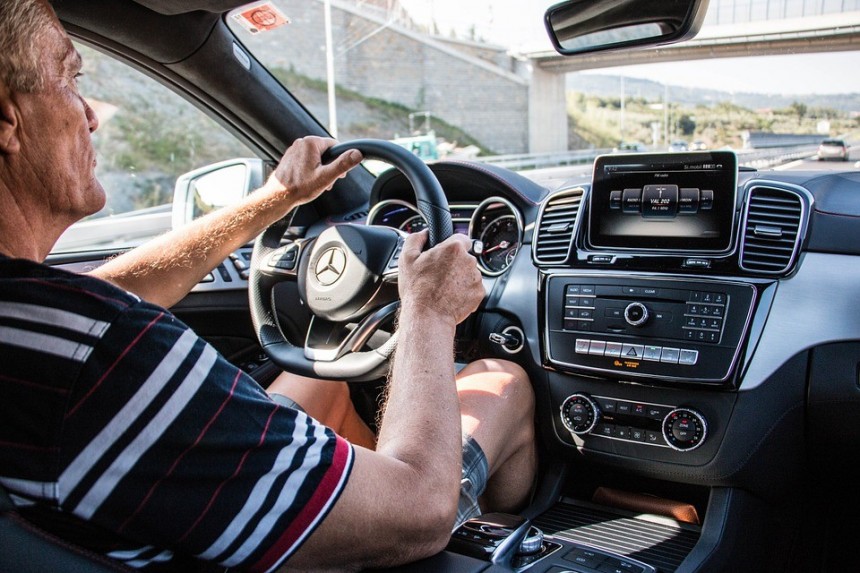We’ve all seen this sight: a tiny grandma or grandpa barely visible from behind the wheel, blinking in disbelief and some apparent confusion at the busy traffic, not quick enough to keep up with it or not careful enough to follow the law.
There are not as many aging drivers as there are young and reckless, but there are plenty of them, too. As of this moment, no country has an upper limit for driving but considering that the baby boomers generation is peaking and the numbers of elderly drivers is expected to increase within a decade, maybe there should be one.
Statistically speaking, elderly drivers are more likely to be involved in fatal accidents and they are most likely to have caused the accident themselves. They are frequently committing traffic violations like running lights, failure to obey traffic signals, failure to yield, and making unsafe turns or passing. From this perspective, saying that they’re worse drivers than other age categories doesn’t seem to be a sweeping generalization but the truth.
Also statistically speaking, elderly drivers are less likely to be involved in incidents caused by speeding or driving under the influence. Say what you will about them, but they are very cautious about these 2 things, sometimes to a fault.
Right now, in order to be able to drive, senior drivers only have to prove they’re fit to do so. In some European countries, they may be asked to have their license renewed after 70 every 3 years, while in the U.S., they may have to follow some restrictions as to the areas or the times when they can be on the road. Overall though, they are not barred from getting behind the wheel, as long as they can provide proof that their eyesight and overall health are ok, or if they can ace their driving test once more.
However, one’s driving abilities are not the sum of one’s health and score on the driving test. Research has shown that men tend to outlive their driving abilities by 6 years and women by 10, but at the same time, women willingly give up driving at some point in their life, letting the husband be the “default driver.”
Aging does different things to the body, depending on whose body it is. Reflexes become slower, the ability to anticipate is diminished, focused and distributed attention are wanting. As you grow older, you become more easily tired or annoyed, and this can impact your driving, especially if traffic is heavy. Sure, you can adapt but there are certain scenarios in which you won’t be able to do that. Does everyone picture right now a nice old lady driving too slow on the highway because the speed limit seems too high for her?
The American Association of Retired Persons (AARP) says that, by 2030, over 78 million baby boomers will be 65 and older, and many of them will be at the wheel of a car. In this context and considering the many incidents in which an old lady or gentleman caused an entirely preventable, quite stupid accident, many proposing an upper age limit wouldn’t be so bad. It may actually be advisable.
There is a lot to be said about “discriminating” against old folks and stripping them of their driver’s license, which stands for independence and a sense of self-worth. Without the ability to drive themselves to where they need to be, they might have to use public transport or to rely on relatives, and this will bring about a whole new series of problems. Then again, there is even more to be said about the safety of motorists, no matter their age.
Elderly drivers can pose a serious risk in traffic, especially in very busy cities, both to themselves and to others, be they drivers or pedestrians. No one’s saying they should be stripped of their driving rights when they reach 70 (because 70 is the new 50, or so the kids say), but having a driver who is 97+ years old at the wheel of a car on a public road seems to spell accident waiting to happen.
Statistically speaking, elderly drivers are more likely to be involved in fatal accidents and they are most likely to have caused the accident themselves. They are frequently committing traffic violations like running lights, failure to obey traffic signals, failure to yield, and making unsafe turns or passing. From this perspective, saying that they’re worse drivers than other age categories doesn’t seem to be a sweeping generalization but the truth.
Also statistically speaking, elderly drivers are less likely to be involved in incidents caused by speeding or driving under the influence. Say what you will about them, but they are very cautious about these 2 things, sometimes to a fault.
However, one’s driving abilities are not the sum of one’s health and score on the driving test. Research has shown that men tend to outlive their driving abilities by 6 years and women by 10, but at the same time, women willingly give up driving at some point in their life, letting the husband be the “default driver.”
Aging does different things to the body, depending on whose body it is. Reflexes become slower, the ability to anticipate is diminished, focused and distributed attention are wanting. As you grow older, you become more easily tired or annoyed, and this can impact your driving, especially if traffic is heavy. Sure, you can adapt but there are certain scenarios in which you won’t be able to do that. Does everyone picture right now a nice old lady driving too slow on the highway because the speed limit seems too high for her?
There is a lot to be said about “discriminating” against old folks and stripping them of their driver’s license, which stands for independence and a sense of self-worth. Without the ability to drive themselves to where they need to be, they might have to use public transport or to rely on relatives, and this will bring about a whole new series of problems. Then again, there is even more to be said about the safety of motorists, no matter their age.
Elderly drivers can pose a serious risk in traffic, especially in very busy cities, both to themselves and to others, be they drivers or pedestrians. No one’s saying they should be stripped of their driving rights when they reach 70 (because 70 is the new 50, or so the kids say), but having a driver who is 97+ years old at the wheel of a car on a public road seems to spell accident waiting to happen.








